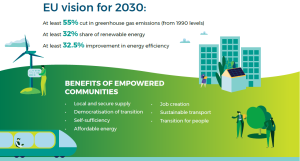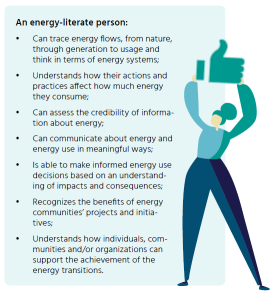What is an energy community
The NEWCOMERS project understands energy communities as any collaboration of citizens and other entities, such as municipalities, companies, energy providers, network operators, NGOs, etc., with the joint aim to contribute to energy system transformation by involving multiple actors in a participatory manner, and by aiming to create benefits for all involved parties (and potentially for society at large).
Energy communities offer an opportunity to transform the energy system into a clean and democratic one. They come in various forms and sizes, from small local communities that are geographically bound (e.g. residents of an apartment building deciding to co-produce their own electricity) to bigger, even international organizations. Their focus on local generation and consumption, and active participation of its members brings several benefits to energy systems and local communities, such as matching energy demand and production, adapting energy generation to locally available sources and providing energy efficiency measures through collective processes and additional activities. Energy communities can additionally work as ambassadors for energy transitions and great sources of information and advice for peers and the public.
With the growth of renewable energy production and the pressing need to decarbonize energy systems, energy communities connect all those willing to actively participate in energy transitions and bring the change into the hands of citizens.

About energy literacy and energy communities
To be good energy citizens and to actively participate in the energy transition, we need a basic understanding of how energy systems work, from the generation of energy and the sources available, to the consumption and the role that we, as citizens, can play in these complex systems.
A good understanding of energy systems and their relationships with the environment and societies can support the ongoing challenge to reduce greenhouse gas emissions (GHGs) and can help achieve the goals set at national and international levels to combat climate change. Within the European Union, the following goals have been set to reduce greenhouse gas emissions:
- 55 % GHG emission reduction by 2030
- 32 % share of renewable energy by 2030
- 32,5 % improvement in energy efficiency by 2030
The ultimate goal of the European Union is to be climate neutral by 2050, which means that by the middle of the century the amount of GHGs emitted in the European Union must not exceed the amount of GHGs that can be absorbed by natural or technical processes.

To achieve these goals, a fundamental transformation of the way we generate, distribute, and consume energy is needed. Energy communities will make an important contribution to this energy system transformation, at the local level but also beyond. In this process, energy communities’ benefit from learning about new technologies and new ways to organize and manage local energy systems. In this way, they can become great resources for energy system change themselves. In fact, energy communities have proven to be great hubs for the diffusion of energy-related knowledge, and to be active promoters of the clean energy movement, both within and outside their communities, for example when communicating to potential future community members, policymakers, media and wider society.
